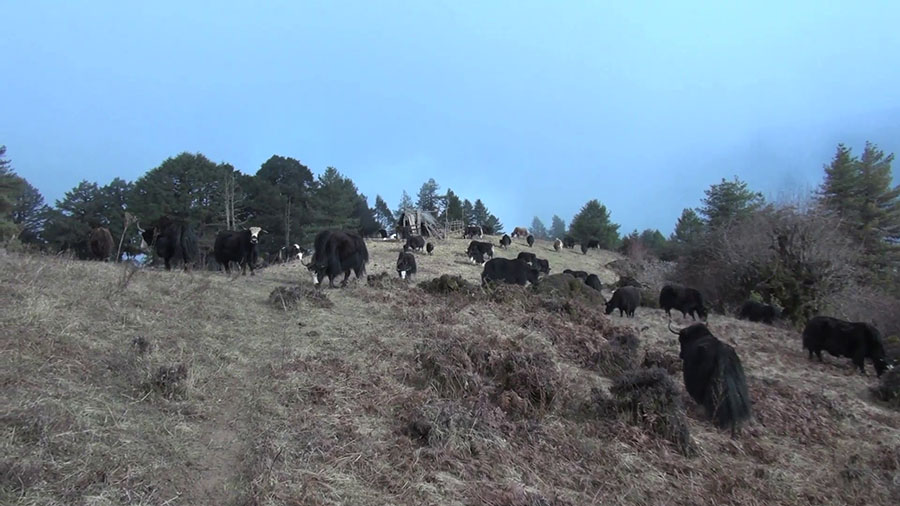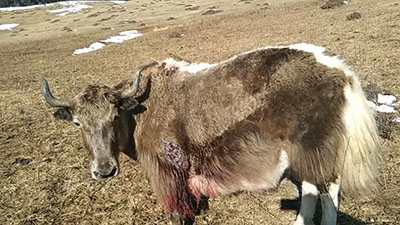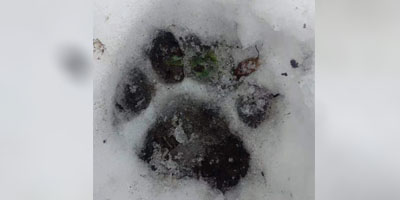
Livestock depredation by predators has become quite rampant in Chungphel Chiwog of Chhumey Gewog, Bumthang in recent years. Of late, tigers have killed several yaks and cattle in the chiwog. Our reporter in Bumthang visited the only family in the chiwog who raises yak and saw for himself the menace brought by the predators.
Misungpang is where the yak shed is located, which is about an hour’s walk from the nearest farm road. It is a place where there are numerous incidents of tiger attacks on yaks. The family from Terzoed village is also the last remaining yak herder in Chhumey Gewog. Sangay Choden, 62, and her grandsons on vacation look after the herd of 130 yaks. With tigers preying on the yaks almost every week, the family says they lost over 40 of them this winter alone.
“I feel sad that I am losing so many yaks. They are our only livelihood. I have seven children and I don’t have land to cultivate, so rearing yaks is my only source of income. We fear that the tigers might even attack us. We get scared when we have to tend to yaks in the forest,” said Sangay.
A few days ago, the boys came across two adult tigers when they drove the yaks for grazing in the morning. The next day, they found one of the yaks killed. Similarly, a few weeks ago, tigers attacked yaks right before the shed at night. Yak casualties have now become a routine in the area.
 One of the yaks is recovering from an injury. The family said although there are policies to protect tigers, there are no policies or regulations to compensate for the lost yaks. So the family end up living in constant frustration and fear.
One of the yaks is recovering from an injury. The family said although there are policies to protect tigers, there are no policies or regulations to compensate for the lost yaks. So the family end up living in constant frustration and fear.
“Foresters ask us to save tigers saying killing them is punishable by law. We don’t have any means to protect our herd. Foresters visit our area to set camera traps but we hardly get any support from them. We have run out of means and our herd size is shrinking,” added Sangay.
“It’s been almost a decade that the tiger attacks have become rife. Yaks are our only inheritance and property. We heard that people in other districts got support from the government. I also hope that my family will get help,” said Choki Dema, Sangay’s daughter, in tears.
 Elsewhere, farmers in Zhurey, Bhim, Tharpaling, Chungphel and Terzoed have also lost cattle to tigers in recent years.
Elsewhere, farmers in Zhurey, Bhim, Tharpaling, Chungphel and Terzoed have also lost cattle to tigers in recent years.
“I lost four cattle this winter alone. My neighbours have also lost several cattle. The alarming thing is that the tigers are not even scared of people. They take cover behind bushes for a while but never go away,” said Nidup Zangmo, a resident of Zhurey.
“So far there was no human casualty but we are always living in fear,” said Ngawang, another resident of Zhurey.
However, the Bumthang Forest Division and the Bhutan Tiger Center are working on developing a Tiger Conservation Fund for the gewogs. Consultation meetings were held recently in Trongsa and Bumthang. Through the initiative, farmers can insure their livestock and receive compensation during tiger attacks.
The initiative, however, is on a pilot basis and its bylaws are yet to be finalised. Meanwhile, Bumthang Forest Division’s chief forestry officer said foresters will soon visit the yak shed in Misungpang to assess the risks and damages.
The bigger picture is that there is still no comprehensive livestock insurance policy in the country. The government reinstated the Endowment Fund for the farming communities to compensate for their crop and livestock losses in late 2019. However, the funding initiative has yet to be implemented.
The Endowment Fund was initiated in 2010 by the erstwhile government. However, due to the lengthy procedure to claim the compensation, it became defunct six years later. In replacement of this, the previous government provided an annual lump sum amount of Nu 300,000 to the gewogs.
But this way of funding was also short-lived since some gewogs used the money on other developmental activities.
Back in the shed, Sangay is waiting for a quick intervention from the forestry officials. She has lost almost half of her herd to predators in the last nine years. The new insurance initiative might give her some solace but it looks like it will only be a matter of time before she gives up on yak herding, altogether.
Kipchu, Bumthang










